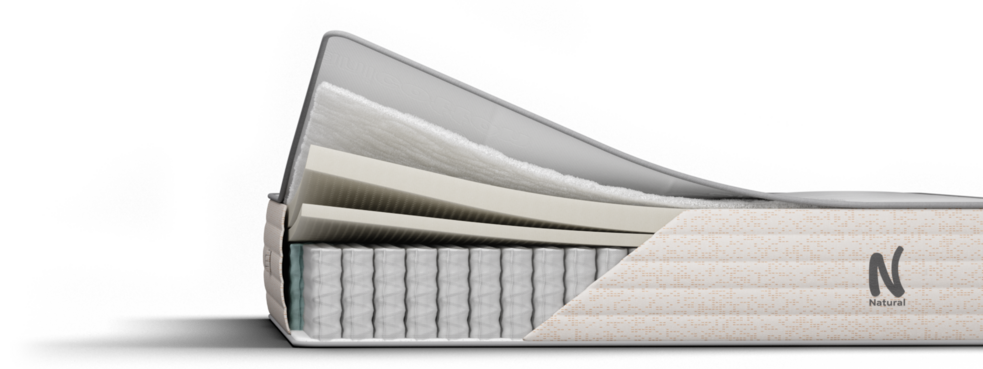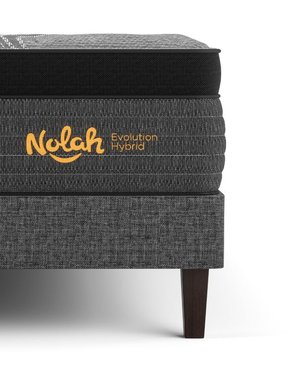Latex Mattress Firmness Guide (2024)
Responsive, pressure-relieving, and ultra-durable latex foam makes the perfect mattress material. It checks all the boxes for sleep comfort and support and withstands the test of time. If you’ve decided on latex as the core material for your next bed, you’re in the right place! The next step is to identify the firmness level that will soothe you to sleep, comforting your joints while supporting your spine.
What Is Mattress Firmness and Why Does It Matter?
A mattress’s firmness level represents how soft or firm a bed feels when you lie down. On a softer mattress, you feel more cushioning and sink further into the pliable surface. With firmer models, you experience more resistance and less contouring.
Choosing the right firmness feel is essential for both sleep comfort and support. Your ideal firmness level will balance pressure relief and supportive structure, while a misfit can jeopardize spinal alignment or agitate your joints.
Mattress Firmness vs. Support
Mattress firmness and mattress support are two distinct attributes, but these traits are closely intertwined. While firmness measures a mattress’s feel, support refers to how well the mattress supports and aligns your spine while you sleep.
They’re different characteristics, but you need to find your ideal firmness level for proper support. On a mattress that’s too soft, your heaviest parts will sink too far into your mattress and pull your spine out of line. If your mattress is too firm, it won’t conform to your spine’s natural curves.
Firmness Ratings and the Mattress Firmness Scale
To help guide customers to the right mattress, brands use firmness descriptors like soft, medium-soft, medium, medium-firm, and firm to distinguish each model’s feel. They also employ the mattress firmness scale, which rates firmness on a scale from 1 to 10. The higher the number, the firmer the mattress.
This scale isn’t uniform across the mattress industry, but the chart below provides an approximate guide. Note that most mattresses fall in the medium-soft to firm range.
Firmness Rating
Feel
1
Extra Soft
2
Soft
3
Soft
4
Medium-Soft
5
Medium
6
Medium
7
Medium-Firm
8
Firm
9
Firm
10
Extra Firm
Soft Mattress Characteristics
More cushioning and deeper contouring
More pressure relief around joints
Firm Mattress Characteristics
More resistance and shallower contouring
Deeper support and structure
Remember, It’s Personal!
As you search for your next mattress, bear in mind that firmness is a subjective experience. The same mattress will feel plusher or firmer to different sleepers depending on their weight and how much pressure they put on the mattress. While useful for comparison, the mattress firmness scale is an imperfect tool. The best way to find your mattress firmness fit is to read reviews and recommendations specifically for your weight class and sleep position.
Manufacturing Firmness for Latex Mattresses
Latex mattresses have a reputation for a firm feel, but this generalization is misguided. Yes, many latex mattresses have a firmer feel than other memory foam models, but all mattress foam types can be engineered at varying densities and firmness levels. You’ll find soft latex mattresses, firm latex mattresses, and everything in between.
All mattress foam types can be engineered at varying densities and firmness levels.
To create latex foam for mattresses and mattress toppers, manufacturers start with liquid latex. Some use natural latex (tapped from rubber trees) for the foam, while others use synthetic latex or a blend of the two. They whip the liquid into a frothy foam, pour it into a mold, and bake it. Processing variables—for example, how the mold is filled—create solidified foams with unique characteristics, including their firmness feel. Also, some mattresses use natural latex (tapped from rubber trees) for the foam, while others use synthetic or blended.
Firmness Level and Latex Types
Under the natural latex foam category, you’ll encounter two variations: Talalay latex and Dunlop latex. Both begin as natural liquid latex, but manufacturers follow different methods to froth, mold, and bake the foam. Our Talalay vs. Dunlop Latex guide covers the differences in detail, but here’s what you need to know:
Both Talalay and Dunlop latex come in a range of firmness levels. However, the Dunlop method results in a denser and more durable foam. Some latex mattresses use Dunlop latex for the more supportive bottom layers and Talalay latex for the upper comfort layers. That said, both forms of natural latex are excellent choices for responsive comfort and spine-aligning support.
Latex Mattress Construction
On that note, a latex mattress’s layer construction is another way manufacturers achieve different firmness levels for each model. The number of foam layers included and each layer’s thickness and density contribute to the mattress’s overall firmness feel. Latex mattresses typically feature plusher layers on top for more cushioning and contouring, with firmer layers below for more structure and deeper support.
You can also opt for a latex hybrid mattress with a coil support core underneath the latex foam comfort layers. The coils add structure and strength, including edge support. Nolah’s latex hybrid, the Nolah Natural, features a plush organic cotton cover, two responsive layers of latex, and a zoned coil support system. It’s a medium firm latex mattress with a 6/10 feel.

Measuring Firmness for Latex Mattresses
Not all mattress brands use or advertise it, but indentation load deflection (ILD) is a common metric for how soft or firm latex foam feels. As you browse latex mattresses, you may see them rated with the 1-10 firmness scale, ILD, or both.
What Is ILD?
Indentation load deflection measures the force required to indent a piece of foam. For latex mattresses, the ILD value represents the pounds of force needed to compress a 4-inch piece of foam by 25 percent. So, the higher the ILD rating, the firmer and resistant the foam.
Latex ILD and the Mattress Firmness Scale
Because mattress firmness is subjective and brands don’t use a uniform scale, it’s impossible to determine exact equivalencies for ILD and 1-10 mattress firmness ratings. However, the chart below offers a rough estimation that can help you narrow your mattress search.
ILD Rating Chart
Latex ILD
Firmness Rating
Feel
12
1
Extra Soft
13-14
2
Soft
15-19
3
Soft
20-24
4
Medium-Soft
25-29
5
Medium
30-34
6
Medium
35-39
7
Medium-Firm
40-42
8
Firm
42-45
9
Firm
46-50
10
Extra Firm
How to Find Your Firmness Level Fit
Whether you choose a latex mattress or ultimately decide to go with another material, finding your perfect firmness level is the key to maximum comfort and quality, pain-free sleep. Follow these recommendations to identify your ideal range.
Consider Your Sleep Position and Weight
There’s no “one-size-fits-all” solution for sleep—your optimal firmness level depends on your body type and sleep position. In general, heavier sleepers need a firm mattress to prevent sinkage, misalignment, and back pain while lighter sleepers need softer mattresses to cushion their curves with less pressure.
Stomach sleepers need the firmest mattresses to keep their spine straight, side sleepers need softer mattresses to cushion their shoulders and prevent hip pain, and back sleepers need something in between. You can use the table below as a rough guide to find your fit:
Side Sleepers
Under 130 lb
4-7
130-230 lb
5-7
230-300 lb
5.5-7
300-350 lb
6.5-8
Back Sleepers
Under 130 lb
4-7
130-230 lb
5-7
230-300 lb
5.5-7
300-350 lb
6.5-8
Stomach Sleepers
Under 130 lb
5-8
130-230 lb
6-8
230-300 lb
6.5-8
300-350 lb
7.5-9
Combo Sleepers
Under 130 lb
4-7
130-230 lb
5-7
230-300 lb
5.5-7
300-350 lb
6.5-8
Research Tips
These tricks can point you in the right direction while you browse mattress collections and compare your options:
Watch or read mattress model reviews from other sleepers with the same sleeper profile (weight group and sleep position) as you.
Consider your current mattress. Is it too soft, too firm, or just right? If you know the brand and model, you can look up its firmness level and go from there.
Trial Periods
If you plan to order your new mattress online, make sure the brand offers a generous trial period for you to get acquainted with the mattress. That way, if the model you chose feels too soft or firm, you can exchange or return it for a refund. At Nolah, we offer a 120-night mattress trial with qualifying mattress purchases.
Frequently Asked Questions
About Latex Mattress Firmness
Disclaimer: Nolah does not provide medical advice. All resources on the Nolah blog, including this article, are informational only and do not replace professional medical counsel. Talk to your doctor about any health, mental health, or sleep-related issues.
You May Also Like These Articles
Don't Sleep on Exclusive Offers
Sign up for our newsletter, and you'll be the first to know about discounts, deals, and what's new at Nolah.
Ready for Bed?
